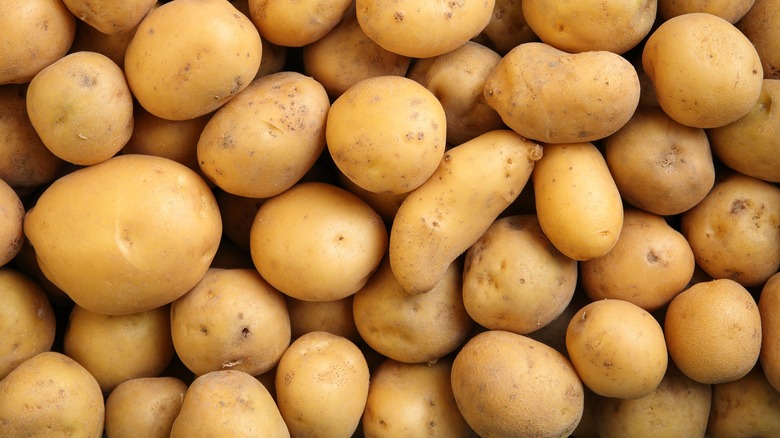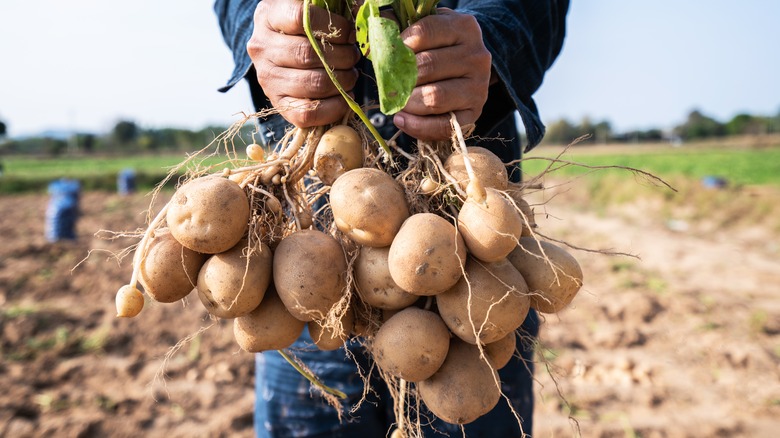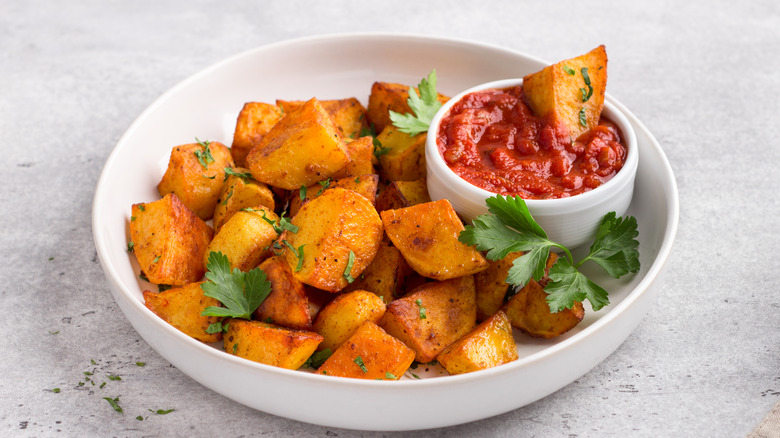The Odd Reason Potatoes Are Called Spuds
We may receive a commission on purchases made from links.
People have loved potatoes for a long time, but the precise details of when and why they got the nickname 'spuds' remain a mystery. It is believed that the historical ancestors of today's tubers were first domesticated by the Incas in the Andes of South America about 1,800 years ago, but the first recorded use of 'spud' in reference to said vegetable dates back to 1840, purportedly from an English traveler making note of it as a strange bit of American vocabulary.
The word 'spud,' however, likely has origins in another language entirely — where it referred not to the crop, but the tool for tending to it. Records from the 1660s demonstrate that the term was, at that time, used to mean 'spade,' and it was probably related to the Danish word 'spyd,' which translates into English as 'spear.' Potatoes themselves are a mysterious plant, given the way that they grow underground and are hidden from sight, so it seems fitting that it takes a bit of guessing and digging to unearth the history of the word 'spud.'
An alternate origin story for spuds
Besides the more straightforward possible etymology of 'spud' that relies on linguistics and farming technology, there is a more quirky alternate origin story for this word. It involves a group of people who were definitely not the biggest fans of the veg. Supposedly, these anti-potato people joined together in the 1800s in Britain to form The Society for The Prevention of an Unwholesome Diet — or, 'SPUD,' for short. They fought against the cultivation and consumption of these tubers based on the belief that they could pose a variety of health risks. (However, there's a lack of evidence that this society existed; its creation is likely from linguist Mario Pei's "The Story of Language," published in 1949 — with no actual proof included.)
The idea that the delicious potato is dangerous may seem surprising given that potatoes are so widely eaten that they are the top crop in the United States today, but they do belong to the nightshade family of plants, which can be lethal under certain conditions. Spuds, like other nightshades such as tomatoes or eggplants, can contain trace amounts of a toxic chemical called solanine, which can cause gastrointestinal problems — though only when eaten in extreme quantities (per Healthline).
Spuds by different names, from different places
If you are wondering why the name 'spud' is so different from the term 'potato,' it's because of the circuitous route that this word took to reach us in the English language. Despite possible Danish influence on our terminology, the history of the tubers themselves is much more closely linked to the latter term, which came to us via the Spanish 'patata' (you may have heard of crispy patatas bravas) from 'batata' of a Carib language of Haiti.
Potatoes grow in all different shapes, sizes, and colors. Today, wherever you are, you can honor the origins of the spud by experimenting with different types of potatoes and the dishes they belong in. A great way to start exploring and appreciating the diversity of tubers is by letting them shine in iconic mashed potatoes from all over the world. To get back to their ancestral roots, try causa, a unique potato salad from Peru.



